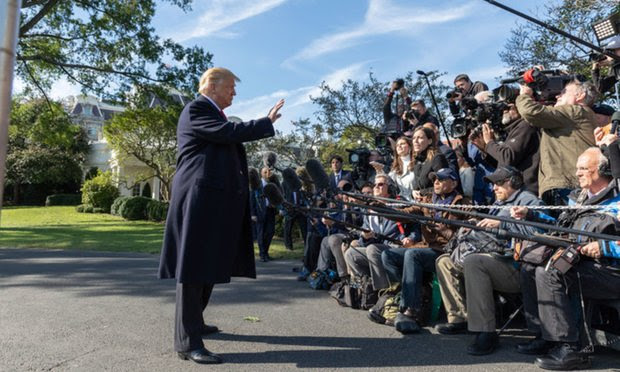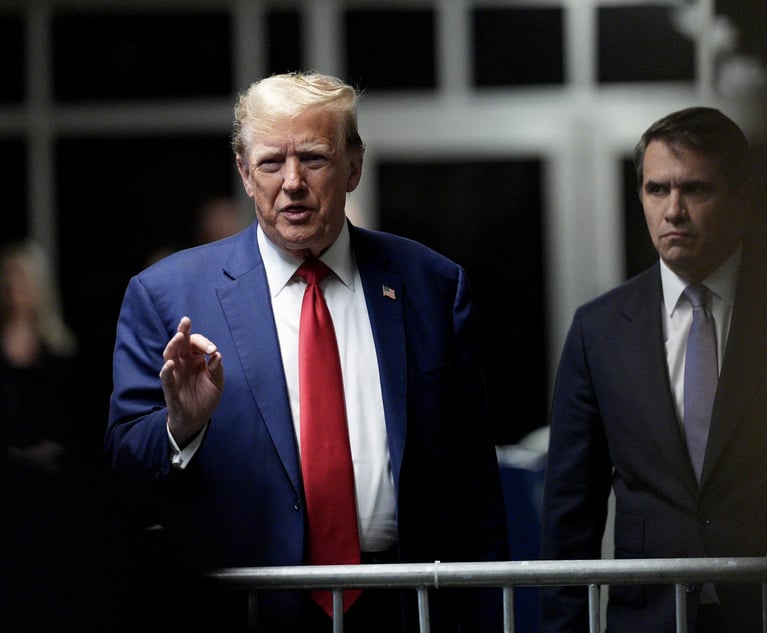Trump Watch: Behind the Scenes: Trump's Lawyers on Negotiating with Mueller
Trump's lawyers build a strategy around cooperating with Mueller's prove to avoid the president sitting down for questions with the special counsel.
March 29, 2019 at 06:46 PM
6 minute read
Welcome back to Trump Watch. Exactly a week ago, U.S. Attorney General William Barr notified Congress that the special counsel's investigation had concluded. This week, we caught up with Trump's legal team. Read below for their thoughts on how President Donald Trump avoided a sit-down interview with the special counsel.
 President Donald J. Trump speaks with reporters. Credit: Official White House photo by Joyce N. Boghosian
President Donald J. Trump speaks with reporters. Credit: Official White House photo by Joyce N. BoghosianTrump's Lawyers and Negotiating with Mueller
For months, it was the key question hanging over the special counsel investigation: would President Donald Trump sit for an interview with Robert Mueller's office? And if he didn't, would the special counsel try to compel him to do so?
That mystery was settled last week when Mueller wrapped up his two-year inquiry without interviewing Trump. In the end, all Mueller got from the president was a written questionnaire, which was negotiated to only include questions about potential coordination between the Trump campaign and the Kremlin.
It's unclear what exactly led the special counsel to back down from an interview. But Trump's legal team crafted a strategy nearly two years ago that appears to have helped them head off a battle.
Crafting a Strategy
It was Ty Cobb, hired on as a White House lawyer, and John Dowd, the president's lead attorney, who decided early in the investigation to embrace an approach of cooperating with the special counsel.
Cobb said the legal strategy was made after conversations with Mueller, and after poring over documents and considering the accruing mountain of requests from the special counsel. Cobb oversaw a small team at the White House—including Steven Groves, now a deputy press secretary—that for months turned over documents to Mueller. But Trump's lawyers believed the approach could also head off a potential subpoena. Cobb said part of the strategy of cooperation was to give Trump's team leverage in negotiations over a potential interview. At the time, the team reasoned that by supplying Mueller with information and witnesses, he would have less of a need—and therefore, a basis—for interviewing or potentially subpoenaing Trump.
One legal precedent that guided their thinking was the D.C. Circuit's decision in In re Sealed Case (Espy), a case that revolved around an independent counsel investigation of Bill Clinton's agriculture secretary, Mike Espy, and raised questions about executive privilege.
Trump's lawyers believed that, under Espy, Mueller could only obtain the president's testimony if that information could not be obtained elsewhere—in the reams of documents and witness testimonies they volunteered to the special counsel, for example.
“To the extent that later in the game that became an issue and there was a desire not to do (an interview), we wouldn't have tripped in any fault lines,” Cobb said. Jay Sekulow, the president' attorney, was brought on in part to study the constitutional issue. But he said, “as the case progressed, and the information was provided and witnesses were provided, it became clear to us that they hadn't met the threshold.”
Trump's lawyers stress they never foreclosed the idea of Trump meeting face-to-face with Mueller.
But through Trump's cooperation, his lawyers had laid the groundwork to push back against a potential subpoena, and bolstered their legal arguments: “We were prepared for it, but we were confident in our case throughout,” Sekulow said. Negotiations Prosecutors nearly interviewed Trump at least once, according to Cobb. There was a tentative interview arranged for Jan. 27, 2018, before Dowd intervened. He was concerned that it would touch on obstruction of justice, a topic he viewed as off-limits.
In the spring of 2018, Cobb and Dowd both left Trump's legal team. But negotiations continued, and Trump's Florida lawyers, Marty and Jane Raskin, took the lead on talks with Mueller, according to Cobb and Sekulow.
At no point did the special counsel take the threat of an interview with the president off the table. “They always maintained the possibility they would do it,” said Rudy Giuliani, who joined Trump's legal team in late April 2018.
Giuliani said the two sides began negotiating the submission of written answers in September 2018. The talks lasted for about two months, and in the end, Trump's lawyers succeeded: the president sent written answers to Mueller's questions, but with the topics significantly whittled down.
Months later, U.S. Attorney General William Barr, in a letter addressed to lawmakers, said Mueller did not reach a determination on whether the president obstructed justice. However, Barr and Deputy Attorney General Rod Rosensteindetermined there was insufficient evidence to prosecute Trump on an obstruction charge.
It's not clear why Mueller did not interview Trump. A spokesman for the special counsel's office declined to comment for this story, and Sekulow declined to comment on those talks.
There's one hint that Mueller may not have formally raised the matter of a subpoena with his supervisors: Barr told lawmakers in an earlier March 22 letter that the Justice Department had not rejected any actions Mueller attempted to take.
What's Next
Democratic lawmakers aren't happy the probe concluded without a Trump interview. They argue an interview was crucial to understanding Trump's state of mind—whether he acted with corrupt intent—in a set of incidents the special counsel was investigating as potential acts of obstruction of justice.
“[I]t was a mistake to rely on written responses by the president,” House Intelligence Chairman Adam Schiff, D-California, said last Sunday in an ABC News appearance. “That is generally more what the lawyer has to say than what the individual has to say.”
“I can certainly understand why the lawyers like Giuliani were fighting this, because the president is someone who seems pathologically incapable of telling the truth for long periods of time. But nonetheless, if you really do want the truth, you need to put people under oath,” Schiff said.
Democrats have mounted a campaign for the release of Mueller's findings and underlying evidence. They could shake loose Trump's written responses to Mueller, although some say those materials would be protected under executive privilege.
For now, the White House and Trump's legal team have vowed to stay out of that decision-making. Giuliani said any decision on privilege would be up to Barr, but he added he had no problem with it. “Nothing in it that would surprise you,” he said.
Trump's former lawyers are content with the conclusion of Mueller's probe. Giuliani said he met with Trump at the White House on Thursday, and that the president was “obviously relieved” with the outcome of the probe.
Dowd refused to answer any questions, but did say: “I'm very happy for the president.”
Speed Reads
How Mueller's Report Lands in Court: Congress, FOIAs and Defendants
Mueller Grand Jury Proceeding 'Robustly,' Prosecutor Tells Judge
With Mueller Probe Complete, Focus Turns to NY Investigations Into Trump Circle and Entities
Where Will Robert Mueller and His Fellow Wilmer Alums Go Next?
This content has been archived. It is available through our partners, LexisNexis® and Bloomberg Law.
To view this content, please continue to their sites.
Not a Lexis Subscriber?
Subscribe Now
Not a Bloomberg Law Subscriber?
Subscribe Now
NOT FOR REPRINT
© 2025 ALM Global, LLC, All Rights Reserved. Request academic re-use from www.copyright.com. All other uses, submit a request to [email protected]. For more information visit Asset & Logo Licensing.
You Might Like
View All
Legal Speak's 'Sidebar with Saul' Part II: GOP Pols Push Misinformation, Cohen Keeps It Together
1 minute read
Trump Barred From Appearing on Illinois Ballot as Overarching SCOTUS Decision Looms
4 minute read

The Judiciary's Electronic Court System Gets Poor Marks | Plus, A Look at Judicial Noms' Pay
6 minute readTrending Stories
- 1No Two Wildfires Alike: Lawyers Take Different Legal Strategies in California
- 2Poop-Themed Dog Toy OK as Parody, but Still Tarnished Jack Daniel’s Brand, Court Says
- 3Meet the New President of NY's Association of Trial Court Jurists
- 4Lawyers' Phones Are Ringing: What Should Employers Do If ICE Raids Their Business?
- 5Freshfields Hires Ex-SEC Corporate Finance Director in Silicon Valley
Who Got The Work
J. Brugh Lower of Gibbons has entered an appearance for industrial equipment supplier Devco Corporation in a pending trademark infringement lawsuit. The suit, accusing the defendant of selling knock-off Graco products, was filed Dec. 18 in New Jersey District Court by Rivkin Radler on behalf of Graco Inc. and Graco Minnesota. The case, assigned to U.S. District Judge Zahid N. Quraishi, is 3:24-cv-11294, Graco Inc. et al v. Devco Corporation.
Who Got The Work
Rebecca Maller-Stein and Kent A. Yalowitz of Arnold & Porter Kaye Scholer have entered their appearances for Hanaco Venture Capital and its executives, Lior Prosor and David Frankel, in a pending securities lawsuit. The action, filed on Dec. 24 in New York Southern District Court by Zell, Aron & Co. on behalf of Goldeneye Advisors, accuses the defendants of negligently and fraudulently managing the plaintiff's $1 million investment. The case, assigned to U.S. District Judge Vernon S. Broderick, is 1:24-cv-09918, Goldeneye Advisors, LLC v. Hanaco Venture Capital, Ltd. et al.
Who Got The Work
Attorneys from A&O Shearman has stepped in as defense counsel for Toronto-Dominion Bank and other defendants in a pending securities class action. The suit, filed Dec. 11 in New York Southern District Court by Bleichmar Fonti & Auld, accuses the defendants of concealing the bank's 'pervasive' deficiencies in regards to its compliance with the Bank Secrecy Act and the quality of its anti-money laundering controls. The case, assigned to U.S. District Judge Arun Subramanian, is 1:24-cv-09445, Gonzalez v. The Toronto-Dominion Bank et al.
Who Got The Work
Crown Castle International, a Pennsylvania company providing shared communications infrastructure, has turned to Luke D. Wolf of Gordon Rees Scully Mansukhani to fend off a pending breach-of-contract lawsuit. The court action, filed Nov. 25 in Michigan Eastern District Court by Hooper Hathaway PC on behalf of The Town Residences LLC, accuses Crown Castle of failing to transfer approximately $30,000 in utility payments from T-Mobile in breach of a roof-top lease and assignment agreement. The case, assigned to U.S. District Judge Susan K. Declercq, is 2:24-cv-13131, The Town Residences LLC v. T-Mobile US, Inc. et al.
Who Got The Work
Wilfred P. Coronato and Daniel M. Schwartz of McCarter & English have stepped in as defense counsel to Electrolux Home Products Inc. in a pending product liability lawsuit. The court action, filed Nov. 26 in New York Eastern District Court by Poulos Lopiccolo PC and Nagel Rice LLP on behalf of David Stern, alleges that the defendant's refrigerators’ drawers and shelving repeatedly break and fall apart within months after purchase. The case, assigned to U.S. District Judge Joan M. Azrack, is 2:24-cv-08204, Stern v. Electrolux Home Products, Inc.
Featured Firms
Law Offices of Gary Martin Hays & Associates, P.C.
(470) 294-1674
Law Offices of Mark E. Salomone
(857) 444-6468
Smith & Hassler
(713) 739-1250








